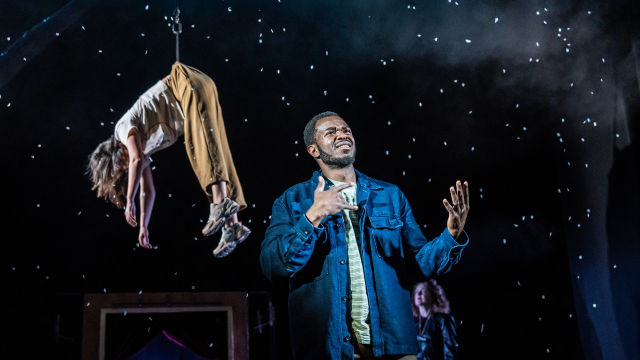
This adaptation of Ilya Kaminsky’s poetry collection is “every bit as urgent, humane and moving as the book that inspired it”, said Sarah Hemming in the Financial Times.
Dublin-based theatre company Dead Centre has joined forces with the sign language poet Zoë McWhinney to “deftly” bring the Ukrainian-American writer’s work to the stage. In a “smartly mischievous” opening, deaf actor Romel Belcher introduces Caoimhe Coburn Gray as his interpreter to help make the show “accessible” for hearing audiences.
Set in Vasenka, a fictional occupied city, the narrative stems from a tragic wartime atrocity: a deaf boy is shot and killed by a soldier for failing to follow a command that he couldn’t hear while watching a puppet show. In an act of solidarity, the entire town turns deaf overnight. The sign language peppered throughout Kaminsky’s original collection “takes on living form as an ensemble of deaf and hearing actors” in this “richly textured” production, slipping between British Sign Language, surtitles and spoken dialogue.
It’s a “wondrous two hours of storytelling that renders the Russian invasion of Ukraine both enchantingly strange and newly shocking”, said Claire Allfree in The Telegraph. The “stylistically thrilling” production weaves together a “feast of theatrical techniques” from acrobatics to live cinema.
Describing something as a “waking nightmare” would usually be a “straightforwardly bad thing”, said Alice Saville in The Independent. But there isn’t anything straightforward about this “unsettling, enthralling” show. An “experimental epic of war and resistance”, it’s a production that will make you “rub your eyes and reach desperately for something real to hold on to”.
“Is it possible, though, to create a fully engaging narrative out of poems that are so full of ambiguity and ambivalence?” said Clive Davis in The Times. There are moments when the production has “more of the static quality of an art installation” than theatre, and it could shave 20 minutes off its running time. The “highly stylised” effects can also start to feel “gimmicky”, said Theo Bosanquet on WhatsOnStage, and the play “struggles to tie its disparate ideas together”.
Overall, though, it’s a powerful piece of theatre that is both “playful” and “provocative”, said Hemming. “The audience, sitting there in silence, can be seen as part of the resistance. But lack of action can also be seen as a failing.”
Until 13 September at Royal Court Theatre, London; then 2-5 October at Samuel Beckett Theatre, Dublin
Ukrainian-American writer Ilya Kaminsky’s poetry collection is brought to the stage in this ‘enthralling’ production






